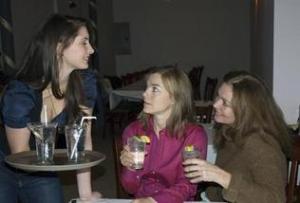She Said, She Said (3/18/2009)

As a Wellesley alum, I am probably the perfect person to review Kathryn Chetkovich’s She Said, She Said, an intimate portrait of a group of friends who met at a women’s college and are now, years later, forced to contend with many of the sociopolitical issues they faced in the seventies. The triad of feminists, now in varying degrees, is shaken to the core when one of their own, Jamie (Shelley McPherson) reveals that her recent ex-husband Ross (Mark Hofmaier) has raped her. The result is an intense eighty minutes of constantly shifting perceptions and sympathies, with an undercurrent of questions concerning how feminism has changed and what it means today.
Most of these questions revolve around Jamie’s friend Claire (Julianne Carpenter) and the impact the rape has (or doesn’t have) on her relationship with her husband-to-be, Ross’ brother Dan (Tom Berdik). For a play that focuses on such a private, sensitive issue and the subtle ripple effect it has on this network of people, the WorkShop’s black box theater is an appropriately intimate space. Director Peter Sylvester optimizes the relatively small stage by dividing it into smaller spaces for the different scene locations. In a play that runs at almost an hour and a half without intermission, there is not only a space constraint, but also a time constraint, especially considering all the time these characters have known each other. To fully convey this history, Sylvester uses projections of old college photos between scenes.
The scenes that feature Chetkovich’s more everyday, free-flowing conversation play very well, but unfortunately some of the more high-stakes dramatic moments fall flat. As a result, many of the big reveals don’t have as much impact as they could. Still, there are certainly highlights among the performances, like Hofmaier’s Ross, who manages to be quite likeable even though he’s initially set up as the piece’s villain. Ashley Anderson is also wonderful as CoCo, the group’s twenty-something friend who waits tables at the bar they frequent. What could have easily been a one-note, one-dimensional caricature is made very real and sympathetic thanks to Anderson’s intricacy and conviction.
Certainly the biggest draw in this production is Chetkovich’s script, which raises important, timely feminist issues in a refreshing way. The friction between the now almost middle-aged college alums and the young CoCo acts as the perfect embodiment of the generational gap amongst today’s feminists. The group’s shock and concern over CoCo’s sexual liberalism forces us to ask ourselves what it means to be a free woman and how we are expected to live that ideal. More specifically, there is the inner conflict of the women’s college alum readapting to the real world and integrating her feminist views into a traditionally patriarchal institution such as marriage.
In the end, however, She Said, She Said is not so preachy. As the play progresses, Chetkovich makes it more about her characters and their particular issues, unraveling their relationships with an elegant subtlety. Just like us, they are all more complex than they seem, and their problems go far beyond the gender issue.